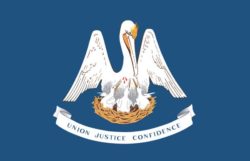Oscar Allen
Democrat Oscar Allen served as governor of Louisiana from 1932 to 1936, Huey P. Long's hand-picked successor after Long resigned to serve in the US Senate.
Democrat Oscar “O. K.” Allen served as governor of Louisiana from 1932 to 1936, the first individual elected to this office after Huey P. Long’s resignation to serve in the US Senate. Long handpicked Allen as his successor, leading many to see him as a puppet governor—a belief Allen reinforced by referring to his term as the “Long-Allen administration.” Noting Allen’s loyalty to his brother, Earl Long reportedly once said, “Oscar was sitting in his office, and a leaf blew in through the open window and landed on his desk. He thought Huey must have sent it, so he signed it.” The Kingfish remained in close contact with Allen through daily phone calls and frequent visits from Washington, D.C. After Huey Long’s assassination in 1935, Allen won the election to replace him in the US Senate but died before he could take office.
Oscar Kelly Allen was born in Winnfield on August 8, 1882, to Asa Levi Allen and Sophronia Perkins Allen. A childhood friend of Huey Long, also born in Winnfield, Allen attended Springfield Normal and Business College in Missouri and Trinity University in Waxahachie, Texas. Between 1906 and 1918 he was a teacher, sawmill manager, farmer, and railroad builder, as well as a worker in the mercantile and oil businesses. He married Florence Scott Love of Paris, Texas, in 1912 and together they had three children: Joyce Love, Oscar Kelly Jr., and Asa Brenton.
Active in the Democratic Party, Allen served as an assessor in Winn Parish and then as clerk of that parish’s police jury before his election to the Louisiana senate in 1928, where he served until 1932. In the senate he was the floor leader for the Long faction. From 1928 to 1932, Allen was also chair of the state highway commission. With the personal support of Huey P. Long and the backing of the Long political machine, Allen easily won the 1932 gubernatorial election.
While he was in office, Allen’s executive power grew as local governments, financially devastated by the Great Depression, increasingly turned to the state for financial assistance. At the same time, Louisiana became more dependent on federal funds and Allen helped local governments apply for federal money. New Deal agencies provided relief in Louisiana until Long, and then Allen, criticized President Franklin Delano Roosevelt. In response many federal public works programs were canceled or curtailed in the state.
After Long’s assassination in 1935, Allen became the de facto leader of the Long political machine. Voters overwhelmingly elected him to fill Long’s position in the US Senate, but he died in Baton Rouge on January 28, 1936, from a brain hemorrhage, before taking office. Subsequently Earl Long, Huey’s brother, assumed the leadership role in the Long dynasty.
Adapted from William D. Pederson’s entry for the Dictionary of Louisiana Biography, a publication of the Louisiana Historical Association in cooperation with the Center for Louisiana Studies at the University of Louisiana, Lafayette.
Sources: Congressional Quarterly, Guide to U. S. Elections (n.d.); Roy R. Clashan, American Governors and Gubernatorial Elections, 1775-1978 (1979); Miriam G. Reeves, Governors of Louisiana (1980); Robert Sobel and John Raimo, Biographical Directory of the Governors of the U.S., (1978); New York Times, January 29, 1936.
